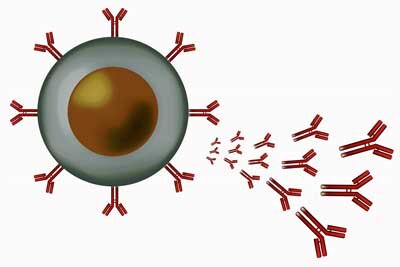Immune Study Adds to Evidence Of Body-Wide Problems With Energy Production in Chronic Fatigue Syndrome (ME/CFS)
Increased expression of CD24 …could thus reflect abnormalities in maintaining appropriate ATP generation (in ME/CFS). The authors
Numerous studies suggest problems with energy production exist in chronic fatigue syndrome (ME/CFS). The huge energy needs exertion places on the muscles and brain suggest they're an obvious place for energy production problems to show up. Ramping up to fight off pathogens also places extreme demands on energy production in immune cells. Now comes a study which suggests that energy production problems in a subset of B-cells could be setting people with ME/CFS up for problems with inflammation and autoimmunity.
B-cells and ME/CFS
The first couple of successful Rituximab trials brought renewed interest in the immune cells most effected by the drug - the B-cells. The last, large Rituximab trial unfortunately failed - the drug does not work in ME/CFS - but the Rituximab effort succeeded in other ways.First off, it brought two creative and dedicated researchers, Oystein Fluge and Olav Mella to the field and energized ME/CFS research in Norway. Secondly, the B-cells - which play a huge role in immunity (and autoimmunity) - finally got some study in ME/CFS. Keeping with ME/CFS's time-honored tradition of falling between the cracks in medicine, several studies found no indication of altered levels of "classical B-cell markers".Something unusual did, however, pop up, in an extended analysis, which went well beyond the classical markers usually explored. In 2015 a study found that a molecule called CD24 was highly expressed in a group of B-cells.CD24 is an adhesion molecule which turns on various signaling networks - it basically tells cells what to do. It is most highly expressed on early stage or transitional B-cells as they emerge from the bone marrow.During the normal transition from immature to mature metabolically active B-cells, early B-cells are tested again and again for evidence that they may be turning into autoantibody producing cells and many are removed. Over time, as these cells transform themselves into mature B-cells, the CD24 molecule gradually disappears from their surfaces. High levels of these molecules in people with ME/CFS suggested that a problem with B-cell maturation might be present.Since antibody producing B-cells play a major role in fighting off infections, having a bunch of immature B-cells hanging around the immune systems of ME/CFS patients could constitute a problem.Plus there's evidence that the CD24 molecule plays a role in several diseases. CD24 polymorphisms (genetic variants of CD24) have been associated with increased risk for and accelerated progression of autoimmune diseases including multiple sclerosis, rheumatoid arthritis, and systemic lupus erythematous. CD24 can also be over‐expressed in many cancers, including B cell lymphomas.In short, it's not a molecule you want to ignore.
Secondly, the B-cells - which play a huge role in immunity (and autoimmunity) - finally got some study in ME/CFS. Keeping with ME/CFS's time-honored tradition of falling between the cracks in medicine, several studies found no indication of altered levels of "classical B-cell markers".Something unusual did, however, pop up, in an extended analysis, which went well beyond the classical markers usually explored. In 2015 a study found that a molecule called CD24 was highly expressed in a group of B-cells.CD24 is an adhesion molecule which turns on various signaling networks - it basically tells cells what to do. It is most highly expressed on early stage or transitional B-cells as they emerge from the bone marrow.During the normal transition from immature to mature metabolically active B-cells, early B-cells are tested again and again for evidence that they may be turning into autoantibody producing cells and many are removed. Over time, as these cells transform themselves into mature B-cells, the CD24 molecule gradually disappears from their surfaces. High levels of these molecules in people with ME/CFS suggested that a problem with B-cell maturation might be present.Since antibody producing B-cells play a major role in fighting off infections, having a bunch of immature B-cells hanging around the immune systems of ME/CFS patients could constitute a problem.Plus there's evidence that the CD24 molecule plays a role in several diseases. CD24 polymorphisms (genetic variants of CD24) have been associated with increased risk for and accelerated progression of autoimmune diseases including multiple sclerosis, rheumatoid arthritis, and systemic lupus erythematous. CD24 can also be over‐expressed in many cancers, including B cell lymphomas.In short, it's not a molecule you want to ignore.
Energy Production Problems in the Immune System
Front Immunol. 2018 Oct 22;9:2421. doi: 10.3389/fimmu.2018.02421. eCollection 2018. CD24 Expression and B Cell Maturation Shows a Novel Link With Energy Metabolism: Potential Implications for Patients With Myalgic Encephalomyelitis/Chronic Fatigue Syndrome. Mensah FFK1, Armstrong CW2, Reddy V1, Bansal AS3, Berkovitz S4, Leandro MJ1, Cambridge G1.
In a 2018 study, a UK and Australian group took B-cells from ME/CFS patients and healthy controls, stimulated them and then monitored what happened. As before, they found an increased frequency of CD24+ B-cells in ME/CFS patients.What made the increased frequency of these naïve CD24 packed B cells in ME/CFS so interesting, though, was their mode of energy production.Examining the metabolism of the ME/CFS patients’ cells, the researchers found a "strong(ly) positive" association between the amount of glycolysis and lactate produced and the expression of CD24 molecules on ME/CFS patients’ B-cells. Put another way, the more glycolysis was used to produce energy and the greater the lactate production (a by-product of glycolysis) - the more the CD24 molecule showed up on ME/CFS patient's B-cells. Lower levels of mitochondria in these cells suggested one reason ME/CFS patients' B-cells may be stuck in this mode. Not surprisingly, the authors found this more prominent B-cell subset in ME/CFS was also largely unresponsive to stimulation.That suggested that not only do the energy problems in ME/CFS extend to the immune cells but that they could be impacting immune functioning - in this case by keeping ME/CFS B-cells in a naïve state - that may be associated with disease.Plus increased levels of the CD24 molecule have also been associated with a damaging state called "senescence". Instead of undergoing a process called autophagy during which a cell’s contents are safely recycled, during senescence - which is often associated with aging - damaged mitochondria cause cells to slowly deteriorate while producing scads of pro-inflammatory factors.An exercise physiologist, Graham Salmun, recently reported that his exercise study results suggest senescence is indeed occurring in ME/CFS. He believes problems with aerobic energy production are a) impairing ME/CFS patients ability to produce energy and b) creating a senescent state that is causing chronic inflammation.Anaerobic Thresholds, Fatty Acid Problems and Autophagy: Dr. Klimas’s Exercise Study
Lower levels of mitochondria in these cells suggested one reason ME/CFS patients' B-cells may be stuck in this mode. Not surprisingly, the authors found this more prominent B-cell subset in ME/CFS was also largely unresponsive to stimulation.That suggested that not only do the energy problems in ME/CFS extend to the immune cells but that they could be impacting immune functioning - in this case by keeping ME/CFS B-cells in a naïve state - that may be associated with disease.Plus increased levels of the CD24 molecule have also been associated with a damaging state called "senescence". Instead of undergoing a process called autophagy during which a cell’s contents are safely recycled, during senescence - which is often associated with aging - damaged mitochondria cause cells to slowly deteriorate while producing scads of pro-inflammatory factors.An exercise physiologist, Graham Salmun, recently reported that his exercise study results suggest senescence is indeed occurring in ME/CFS. He believes problems with aerobic energy production are a) impairing ME/CFS patients ability to produce energy and b) creating a senescent state that is causing chronic inflammation.Anaerobic Thresholds, Fatty Acid Problems and Autophagy: Dr. Klimas’s Exercise Study
Conclusion
This study provided an intriguing metabolic snapshot of the immune system. The fact that increased expression of the CD24 molecule has been associated with autoimmune disorders and cancer makes the CD24 finding in ME/CFS interesting, but the metabolic connection the researchers found may be more important.Their findings suggest that the same problems producing energy found elsewhere in ME/CFS may also be occurring in their immune cells. Plus the findings suggest that a state of senescence, chronic inflammation and cellular unresponsiveness may be present as well. The possible penalties of having an immune system with a broken aerobic energy production system could go beyond fatigue and pain and extend to problems with autoimmunity, and perhaps in rare cases, cancer.Studies finding an increased reliance on anaerobically produced energy in the muscles, the brain, in neutrophils and now in some of the B-cells all suggest that a body-wide disruption in energy production may be present in ME/CFS. 
